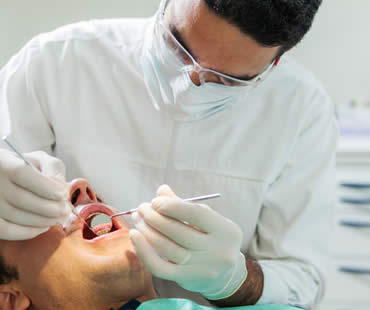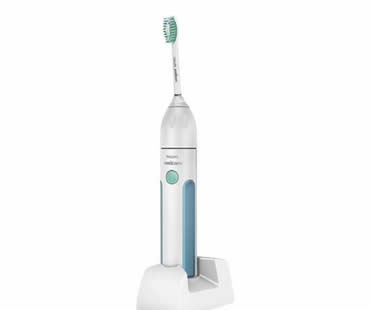
by Dr. Adkins | Apr 24, 2020 | Blog, Dental Topics 2, General Dentistry
It’s easy to put off a trip to the dentist if you’re not experiencing any pain or noticeable issues. Maybe it’s inconvenient in your busy schedule, maybe you don’t want to spend the money, or maybe you experience anxiety about dental visits. None of these are good enough reasons to forego proper dental care so that you ensure a healthy mouth and attractive smile.
Having regular checkups with your general dentist is important for a variety of reasons. Probably the most beneficial reason is to catch problems early, before they have time to become serious and negatively impact your oral health. Cavities and gum disease are both examples of issues that can wreak havoc in your mouth if left untreated, but if handled quickly they may disappear with as little as a fluoride treatment or change in your hygiene routine. Avoiding treatments like fillings, crowns, or root canals – not to mention the associated costs to your wallet and your schedule – are great reasons to see your dentist every six months!
Another benefit of regular checkups is a brighter, more beautiful smile. Even the best dental hygiene at home can’t reach every bit of plaque or tartar that accumulates on your teeth. Professional cleanings eliminate buildup to give you a more appealing smile, as well as removing harmful and stinky bacteria from your mouth.
Your overall health also reaps the rewards of consistent dental care. Oral problems can impact your general health through things like introducing dangerous bacteria into your body that can spread and cause various health risks. Also, your dentist may notice signs of health issues you might not realize, such as cancers or diseases or nutritional deficiencies.
Make your smile a priority and visit your general dentist regularly. Don’t let excuses get in the way of receiving the rewards dentistry has to offer.
We treat patients from McDonough and the surrounding area

by Dr. Adkins | Mar 13, 2020 | Blog, Dental Topics 1, General Dentistry
There are few things more irritating than having a painful, swollen sore in your mouth. It bothers you while eating, talking, and even just sitting around. There are a number of types of mouth sores with different causes. Some are infections from bacteria, viruses, or fungus. Or they can be a result of an ill-fitting denture, broken tooth or filling, or loose orthodontic wire. Mouth sores can also be a symptom of a medical condition. Here are some details about common mouth sores.
Canker sore
These small sores occur inside your mouth, and are white or gray with a red outline. They aren’t contagious, but are recurring and can happen one-at-a-time or several at once. Experts believe that lowered immune systems, bacteria, or viruses are risk factors. Canker sores often heal by themselves in about a week, and topical anesthetics or antibacterial mouthwashes may provide relief.
Cold sore
Also called fever blisters, these sores occur outside of your mouth around your lips, nose, or chin. These blisters filled with fluid are caused by the herpes simplex virus type 1, and are extremely contagious. Once you have been infected with the herpes virus, it remains in your body and occasionally flares up. Cold sores usually heal in about a week on their own. Topical anesthetics may help, and your dentist might prescribe antiviral medications to reduce outbreaks.
Candidiasis
Also called oral thrush, candidiasis is a result of the yeast Candida albicans reproducing in large quantities. It usually happens to those with weakened immune systems, and is common with people wearing dentures or with dry mouth syndrome. Candidiasis is also linked to taking antibiotics. Controlling candidiasis is done by preventing or controlling the cause of the outbreak. Ask your dentist for advice.
Leukoplakia
Common with tobacco users, leukoplakia are thick white patches on the inside of your cheeks, gums, or tongue. In addition to tobacco use, they can also be caused by ill-fitting dentures or continual chewing on the inside of your cheek. Leukoplakia is linked with oral cancer, so your dentist may advise a biopsy if the patch looks suspicious.
Contact our dental office in McDonough to schedule a dental checkup.

by Dr. Adkins | Mar 6, 2020 | Blog, Dental Topics 2, General Dentistry
If you have severely damaged, diseased or injured teeth, your dentist may recommend crown and bridge treatment. A crown is a dental restoration that fully covers a tooth and becomes the tooth’s new outer surface. A bridge is also a dental restoration that is anchored to natural teeth. However, a bridge replaces and fills the gap left by multiple missing teeth. Both crowns and bridges are made from a variety of materials and can be matched to the color of your natural teeth. Unlike removable dental devices like dentures, crowns and bridges are permanently affixed to existing teeth or implants allowing them to look and function similarly to natural teeth.
In addition to restored function and appearance, crowns and bridges offer a host of additional benefits including:
- Dental crowns protect and strengthen the natural tooth, helping you to avoid extraction.
- Crowns are the final step in root canal treatment, protecting the tooth from bacteria that could re-infect the treated tooth.
- Crowns and bridges restore missing teeth and support the remaining teeth.
- Your natural bite is restored and maintained with crown and bridge treatment.
- Placement of crowns and bridges improve your speech, smile and chewing function.
- Adjacent teeth are prevented from shifting and tilting with crown and bridge treatment.
- Crowns and bridges are long-lasting, predictable and durable.
- Placement of crowns and bridges is quick and can usually be completed in as little as two appointments.
- Alternatives to crown and bridgework, like dental implants, are usually more invasive requiring surgery and possibly bone grafting to place the implant.
Consult with your dentist to find out more about the advantages of crowns and bridges and how they can help to restore your healthy smile.
If you need a dentist in McDonough contact us today

by Dr. Adkins | Jan 24, 2020 | Blog, Dental Topics 1, General Dentistry
Chances are that you want to have a smile full of sparkly, white, straight teeth. You must not forget about the goal of having a healthy smile too. If you don’t pay proper attention to your mouth, there are a number of diseases and problems that can arise. Poor hygiene causes many problems, from minor to severe, so it’s smarter to make sure your teeth stay in good condition. Follow these suggestions for a healthy smile.
Focus on daily care
Your mouth requires care every single day. You simply can’t perform hygiene tasks once every few days or just when it’s convenient, and expect to have a healthy, attractive smile. Follow your dentist’s instructions on properly brushing your teeth at least twice daily, and flossing every day too. In fact, flossing is just as important to your oral health as brushing! By performing both of these daily tasks, you’ll be able to remove debris and germs and improve your smile.
Choose your products wisely
Select toothpaste that meets your goals. It should always contain fluoride, but you can also choose brands with objectives like tartar protection, improving bad breath, and teeth whitening. You may also want to choose a mouthwash that you can use to quickly clean your mouth, or supplement your other oral care products.
Don’t ignore your dentist
Even if you’re properly caring for your mouth at home, it’s important to continue seeing your dentist regularly. Experts suggest having dental checkups every six months, so your dentist can look for problems like gum disease, cavities, and infections. It’s smart to get any issues treated right away, before things worsen and lead to more costly, painful procedures later.
Schedule your appointment today at our McDonough dental office.

by Dr. Adkins | Dec 27, 2019 | Blog, Dental Topics 1, General Dentistry
Most people know that keeping your mouth clean is the best way to have an attractive and healthy smile. However not so many will be aware of the benefits to general health. Having healthy teeth and gums helps protect your overall health.
What Is Oral Health?
Oral health is concerned with the condition of any of the structures in your mouth, including your teeth, gums, tongue and all your oral tissues.
How Is Oral Health Related to Overall Health?
When your teeth and gums are healthy then it’s much easier to eat a varied and nutritionally sound diet. Choosing foods that are good for your teeth, for example those that are low in sugar, will also benefit your general health. Having a nice smile helps boost self-esteem, and good oral health decreases the risk of bad breath. It’s also much easier to speak clearly when you have all your teeth.
Which Oral and General Health Conditions Are Linked?
Oral health has been connected to a number of different general health issues. Clinical studies have found links between gum disease and diabetes. For example, uncontrolled diabetes can increase the amount of glucose in the saliva, increasing the risk of gum disease. Conversely gum disease causes bleeding gums that allow bacteria in the mouth to enter into the bloodstream where it’s thought they can create new sites of inflammation, making it more difficult to control blood sugar levels. In addition diabetics find it more difficult to heal. Gum disease has also been linked to heart disease, and people with unhealthy gums could be at increased risk of developing heart issues.
How Can I Achieve Good Oral Health?
It’s important to visit your family dentist in McDonough as often as recommended. Book professional tooth cleanings at the same time as this will reduce bacteria in the mouth, helping to keep your gums healthy and strong. People with diabetes or other medical conditions that compromise their immune system may need to visit their McDonough general dentist more frequently.

by Dr. Adkins | Dec 13, 2019 | Blog, Dental Topics 1, General Dentistry
Dentists say that electric toothbrushes really can make a difference in your ability to clean your teeth and gums. However, not all models provide the same amount of benefits. There are some important things to know about making your choice so that you purchase the best toothbrush for your needs. Here are some guidelines to consider when selecting an electric toothbrush.
Toothbrush heads
If several people will be using the toothbrush, look for one with assorted head sizes. Adults and children need different sizes of heads for the best results. Also, make sure you choose a model with replaceable toothbrush heads. This will save you money in the long run because you’re only discarding old heads, instead of throwing away entire electric toothbrushes.
Batteries
Your electric toothbrush needs a rechargeable battery so that you’re not investing money in new batteries all the time. Also, your fully charged toothbrush should last over a week. You shouldn’t have to charge the toothbrush all the time, just like you shouldn’t have to with other electric items like your laptop.
Spinning
Some electric toothbrushes offer a special type of head that spins all the way around, which allows you to clean areas that other brushes have a hard time reaching. A spinning brush may cost a bit more, but it really does a great job of helping to fight plaque and prevent gum disease.
Warranty
Look for a toothbrush with a warranty, especially when you’re buying an expensive model. That way if something unexpected happens, it might be covered under the warranty instead of having to purchase a whole new brush.
General and family dentist in McDonough








 (470) 665-5292
(470) 665-5292  E-Mail Us
E-Mail Us 
